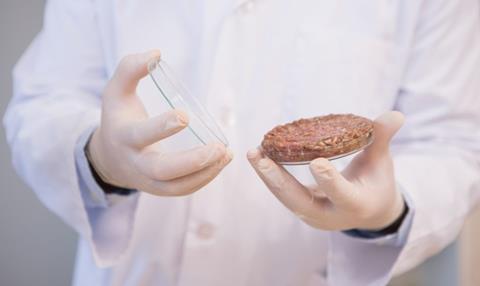Corporate finance advisor Oghma Partners has published its Autumn 2023 report on cell-based meats, reviewing the handful of companies have scooped up the "lions-share" of funding in this area.

The top five cell-based meat manufacturers (UPSIDE Foods, Believer Meats, Wildtype, Aleph Farms, and Mosa Meat) account for 46.9% of all funds raised FP 2016-2023 year-to-date (YTD).
California-based UPSIDE Foods has raised £555.1 million in funds, representing 21.5% of the global total.
Companies that work on the development and production of cell-based meat have had 68% of deal activity directed towards them. The remaining deal activity was spread across cell-based seafood (17%), ingredients (11%) and pet food (4%).
Currently the sale of cell-based meats is regulated and approved in two countries (Singapore and the USA.), in which just two companies have regulatory approval; UPSIDE Foods (USA) and Eat Just’s ‘Good Meat’ (US and Singapore).
Oghma Partners said that approval in the USA is a critical development given the size of the consumer market, while regulatory progress looks promising in many other nations, where Governments have already shown interest and support for cell-based meats (including Government backed programmes in Israel, UK, Netherlands and China).
Some nations have also set out or are developing frameworks by which companies will gain regulation for sales within the market; mostly through existing 'novel foods' frameworks. However, not all nations view cell-based meats favourably, as the Italian Government recently moved to ban any cell-based meat activity within Italy.
Seeing "substantial potential"
Mark Lynch, partner at Oghma Partners, said: “A key driver of the rationale behind cell-based protein production is to generate cheap, low carbon protein without the need for antibiotics and in a safe and controlled environment.
"We believe that this potential has driven interest and speculative investment into the industry. Significant investment into the cell-based meat industry has led to increasing cap-ex spend with many companies scaling up production capacity and R&D facilities.
"These investments, some of which are yet to be completed, have the potential to accelerate the launch of products to consumers in the cell-based meat space. However, money for new investment is now harder to come by, as the slowdown in funding so far in 2023 demonstrates.
"The industry will be challenged to deliver sales to consumers and to stretch funding runways to the point of delivering profitability. We see a shake-out similar to that we are seeing in the plant-based meat sector, with consolidation amongst the players most likely."
Lynch said: “The USA is paving the way for the cell-based meats industry globally with the largest number of investors, and producers. A favourable regulatory environment and ease of business is seeing the USA become a hub for industry activity. Multiple overseas companies are looking to relocate or move certain operations to the USA.
"Israel and the UK are the second and third most active countries, after the USA, in terms of the level of funding for cell-based meat start-ups which reflects a combination of the level of innovation going on in their respective food industries/universities as well as the capital market pool available, combined with a flexible regulatory environment.”
This story was originally published on a previous version of the Meat Management website and so there may be some missing images and formatting issues.












